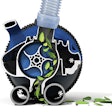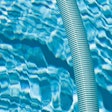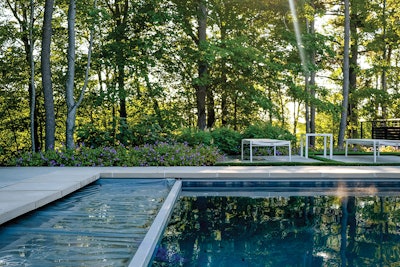
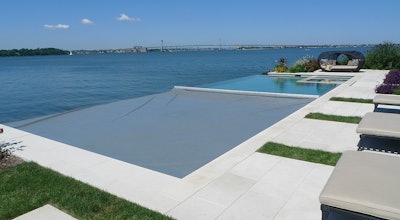 This breathtaking project using an Aquamatic pool cover comes from Paco Pools and Spas in Throgs Neck, overlooking the East River in New York.Photo courtesy Paco Pools
This breathtaking project using an Aquamatic pool cover comes from Paco Pools and Spas in Throgs Neck, overlooking the East River in New York.Photo courtesy Paco Pools
Automatic pool covers have reached a pivotal moment in their history. As a product with a host of compelling benefits, starting with safety but ranging through chemical savings and convenience, they enjoyed enviable market growth for decades. Now, as manufacturers are emerging from a pandemic that choked their supply chains and labor pools while broadening their lead times, perhaps their two greatest features, water and energy savings, have surged into the limelight.
"Look at the kind of savings you get with an auto cover," says Mark Smith, product manager for Lindon, Utah-based manufacturer Coverstar. "Savings on heat and energy is a massive one, because you see more heat leave a pool through evaporation than by any other means. When the outer cover is closed, the heating-cost reduction is huge."
Jacob Bloss, director of operations, Cover Care, LLC, notes that in colder markets, an automatic pool cover can save an estimated $3,000 in heating expenses annually. But demand is skyrocketing in warm-weather markets, too — especially drought-ridden states and communities in which state laws or local ordinances increasingly require an automatic pool cover for safety or energy conservation, or both.
According to the U.S. Department of Energy, automatic pool covers also conserve water by reducing the amount of make-up water needed by up to 50% and reduce a pool's chemical consumption by up to 60%.
"It's almost like the electric car phenomenon," says Tom Dankel, vice president of Aquamatic Cover Systems, a manufacturer in Gilroy, Calif., referring to how an automatic pool cover can make pool owners feel better about themselves. "I've had conversations where people say, 'I'm putting a cover on because I don't want my neighbors thinking I'm being wasteful.' It's an environmental decision, but it's also a social decision."
Dankel chuckles when recalling how, in the Eighties, "we used to tell people how automatic pool covers could pay for themselves, but it fell upon deaf ears."
"Now, if you can help consumers understand that, 'Hey, you can pay for this cover in five years just through energy efficiency,' that's a big selling point," says Graham Orme, product manager for West Valley City, Utah-based manufacturer Cover-Pools, a Fluidra company. "I think that's going to take hold, and cover installations are going to continue to go up."
 Manufacturers are optimistic about the market in 2023. One reason is the fact that the product is the final piece of a project, and many are already in the ground or are breaking ground soon.Photo courtesy Aquamatic
Manufacturers are optimistic about the market in 2023. One reason is the fact that the product is the final piece of a project, and many are already in the ground or are breaking ground soon.Photo courtesy Aquamatic
PANDEMIC WOES LINGER
A few years ago, the outlook wasn't quite so bright. Sure, like every other segment of the swimming pool business, the automatic pool cover market broke
all kinds of sales records during the pandemic. But at the same time, the industry was plagued by supply and labor shortages.
"We ran out of material," Orme admits. "It took us a while to get our supply chain up to speed, because no one expected 50% growth year over year. And when you grow at that pace, you realize really quickly you don't have the capacity for the type of growth that you're going through. And, you know, that kind of growth can break a company. Luckily, it didn't break us."
The pandemic did not break any major automatic pool cover manufacturers, but it did force them to make production and operational adjustments on the fly. "When we saw what was happening, we told our purchaser to just buy double or triple of everything, so we really didn't have supply chain issues," Dankel says. "But now, we're being quoted extraordinarily long lead times by certain suppliers; fortunately, we keep multiple suppliers."
Other manufacturers also turned to alternate suppliers, too, and some reported shortages of key materials like aluminum extrusions and motors to drive cover mechanisms.
"I think we have put enough backup plans in place — Plans A, B, C and D — that we are not going to run into any supply issues in the next year," Smith says. "But finding people who want to work and who are reliable is a struggle, from manufacturing through installation."
While he believes there will continue to be plenty of employment opportunities in the automatic pool cover business, certain geographical markets will flourish more than others when it comes to finding qualified installers and training new ones. "For areas that already have pretty good market penetration for auto covers, it will only be moderately difficult," Smith says. "But for those markets where auto covers are more novel and newer, it's going to be more of a struggle."
Some pool builders who, under more typical circumstances, also would install covers on their projects, are opting to subcontract for that work — citing both increased demand and lack of labor, according to Mike Shadoan, vice president of Automatic Pool Covers Inc., a manufacturer based in Westfield, Ind. In those circumstances, the pool builder essentially takes on the role of a general contractor.
"If the pool company has, say, 10 good employees, why worry about them having to do an auto cover and all the work that goes with it?" Shadoan asks. "They can save time by just subbing that out to a local installer, and they can be building more pools on their own every day. That's become a very popular option in markets where demand is high."
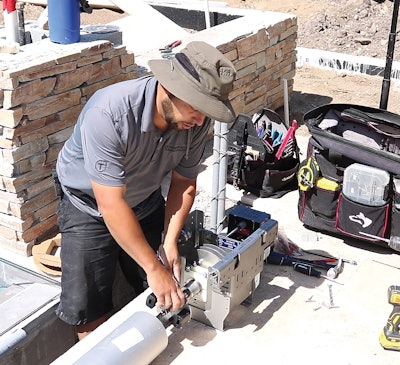 Finding skilled workers to install APCs has become increasingly difficult, even as sales have soared.Photo courtesy Cover-Pools
Finding skilled workers to install APCs has become increasingly difficult, even as sales have soared.Photo courtesy Cover-Pools
EDUCATION REMAINS VITAL
Despite the popularity of automatic pool covers in many parts of the country — and the fact that the product was invented all the way back in 1959 by Cover-Pools' Joe Lamb — the reality is that pool professionals and pool owners both could use a primer.
"The majority of people — unless they live in a market where there's already a lot of automatic covers on pools — don't even know they exist," Smith says. "So there is a lot of education that has to happen all the time."
Orme contends that some builders still "don't want to touch them because of how complex they are," whereas according to Bloss, other builders probably don't yet know the product's full benefits or don't promote the product because of its design constraints. Manufacturers offer training events every year, though, which is helping change perceptions.
"In some markets, the product isn't pushed as hard as it could be, but in general terms, I do see the industry embracing the product more as time goes on," Bloss says. "As builders buy into the value, they're changing their designs to better accommodate a cover, and as more consumers hear and learn about the product, especially in markets where an automatic pool cover or fence is required, it kind of sells itself."
Manufacturers also are altering their products to make them more appealing to builders. Coverstar even revisited its technology and assembly, resulting in a "huge rush of new product innovation and design that has really helped us make it easier to manufacture an automatic cover and even easier to install an automatic cover," Smith says.
Increased education is expanding the market, too. "Every year, we're trying to promote them more and help people understand them better," Shadoan says. "If dealers aren't selling auto covers on their pools, we let them know they're missing out on revenue, because the fabric has to be replaced every seven years. And the ones who already know that are pushing an auto cover on every job."
As for consumers, here's what consumers need to know, according to Shadoan: "An auto cover is going to make your pool safer, it's going to make it cheaper to own, and it's going to make life easier for you. Have you ever talked to somebody who has an auto cover and says they regret it?"
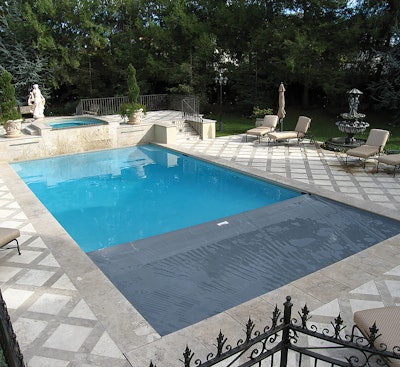 More heat leaves an uncovered pool through evaporation than by any other means.Photo courtesy Coverstar
More heat leaves an uncovered pool through evaporation than by any other means.Photo courtesy Coverstar
OUTLOOK FOR 2023
As 2022 ended, automatic pool cover manufacturers remained mostly optimistic about the market. One reason is the fact that the product is the final piece of a project.
"We'll do covers in spring and summer of 2023 that were sold in 2022," Dankel says, adding that Aquamatic also sells directly to consumers at dealer prices and has seen steady retrofit sales. "If the pool industry falls flat, we don't see the effects until a year later. But that being said, I think people overall are just smarter. The ratio of pools to covers has greatly increased, and all of us collectively have reaped the benefits."
Orme agrees, noting that Cover-Pools implemented a second production shift during the pandemic that is still going strong. "The rest of the industry is kind of seeing a dip right now," he says. "We're not. Automatic pool covers go on higher-end pools, and my assumption is that those types of pools are still going in. So cover demand is not slowing down; what's holding us back is the workforce to install them all."
Besides labor, another concern is a looming recession. "I had a local builder call me and say he had three jobs, all with permits, that have been put on hold indefinitely," Dankel says. "They were shovel-ready, we were ready to activate three jobs, and then all those customers — in the same week — pulled away due to the cost of financing their projects. Will they come back around? Who knows?"
This much is clear: Given the product's undeniable advantages, the automatic pool cover business is a pretty good space to be in right now.
"I'm excited, and I think other people should be, too," Shadoan says. "Inventories are getting a lot better. When there were long turnarounds for manufacturers, the end user was being hurt, because they paid a lot of money [for the product]. Now, those lead times have decreased. We aren't back to normal levels yet, but we're a lot closer."
This article first appeared in the February 2023 issue of AQUA Magazine — the top resource for retailers, builders and service pros in the pool and spa industry. Subscriptions to the print magazine are free to all industry professionals. Click here to subscribe.





























